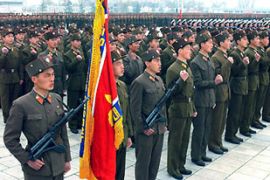At the time diplomats expressed concern that the six-party format appeared deadlocked and might even be abandoned.
US officials say the Berlin talks are intended to create a positive atmosphere for the next round of six-party talks, which will include North Korea, the US, South Korea, Russia, China and Japan.
Hill is due to leave Germany on Thursday for visits to China, Japan and South Korea.
‘Favourable atmosphere’
|
|
2003
August: First round of six-party talks in Beijing. North Korea issues plan to help reduce tensions, but talks fail to produce an agreement
2004
February: Second round of talks make no significant progress
June: Third round of talks discusses scope, time, and method of verification for disarming North Korea. Again no agreement is made
2005
September: At a fourth round of talks all parties agree plan of action under which North Korea would end its nuclear programme in exchange for aid and security guarantees
North Korea subsequently demands a civilian light-water reactor; a demand rejected by the US and Japan
2006
October 9: North Korea conducts first nuclear weapon test
December: Fifth round of talks end in deadlock. North Korea insists US financial sanctions end as a precondition to disarmament talks
|
“We want to make sure that the next round of six-party talks is fully prepared so that we can make progress there,” said Condoleezza Rice, the US secretary of state, who was also in Berlin on Wednesday to meet with German leaders.
“[This] should help to prepare the way for a more favourable atmosphere at the time of the resumption of the six-party talks, which we hope would be soon,” she said.
The Berlin talks come amid speculation that the Bush administration is looking at ways to ease financial sanctions against North Korea, perhaps as a way of pushing forward negotiations.
North Korea has around $24 m frozen in the accounts of a Macau-based bank, held after the US accused it of money laundering on behalf of Pyongyang.
Commenting on the Berlin meetings on Wednesday, a US State Department spokesman said that while the subject of the sanctions might have been raised they were not up for discussion at the talks.
“The question is not somehow that the U.S. is going to change its law or change its policy on this issue,” Tom Casey said.
“The North Koreans have to decide if they want nuclear weapons or if they want a place in the international community,” he said.
